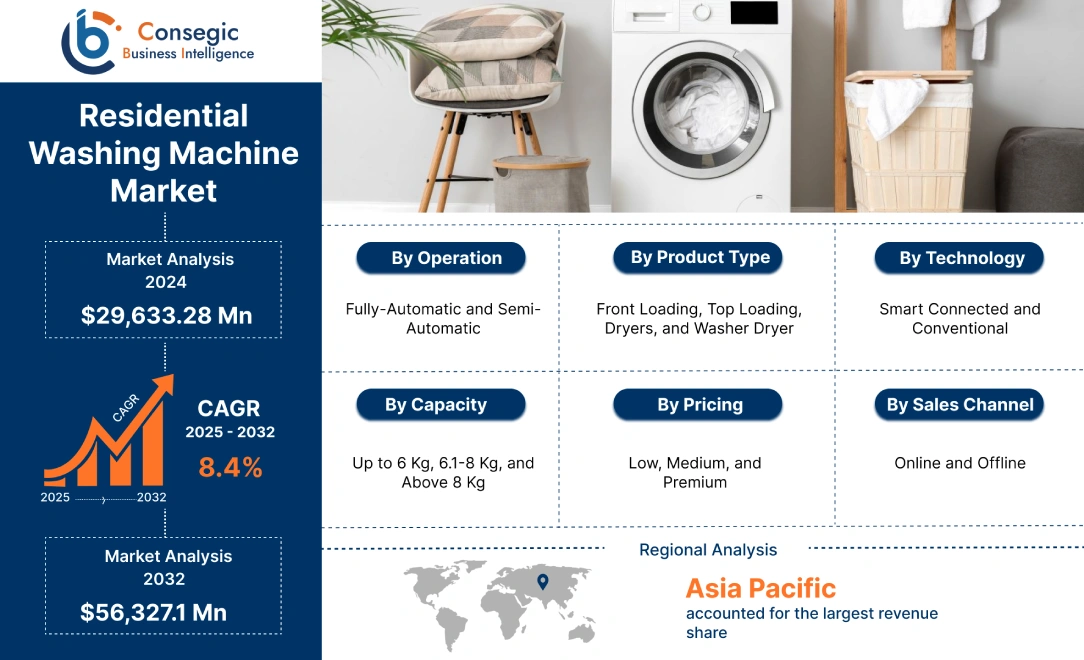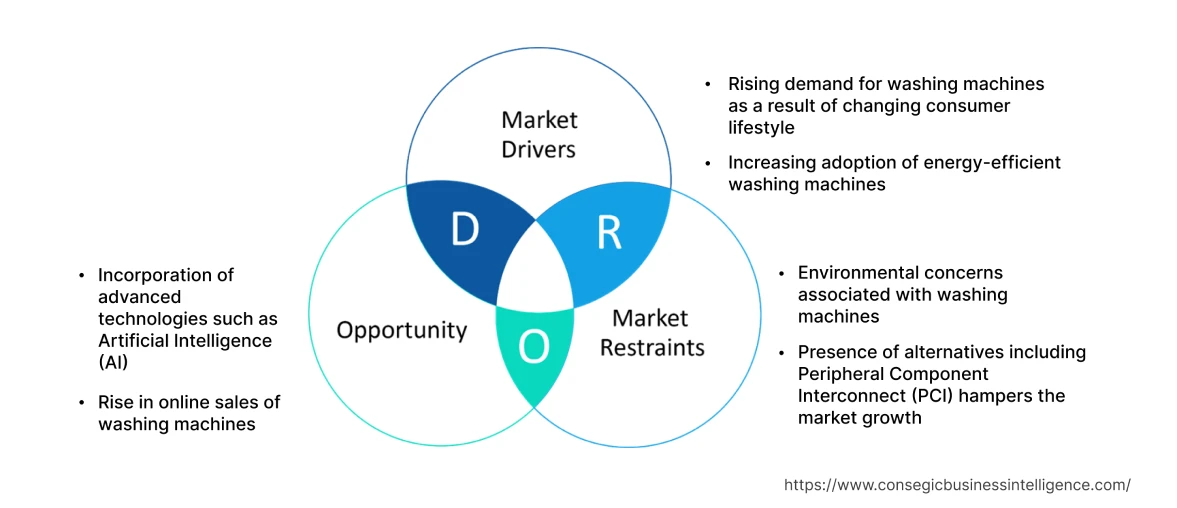- Summary
- Table Of Content
- Methodology
Residential Washing Machine Market Introduction :
Residential Washing Machines Market size is estimated to reach over USD 56,327.10 Million by 2032 from a value of USD 29,633.28 Million in 2024, growing at a CAGR of 8.4% from 2025 to 2032.
Residential Washing Machine Market Definition & Overview :
A washing machine is an electronic appliance used for washing and cleaning clothes by spinning the laundry under a centrifugal force in the presence of detergent and water. A washing machine reduces human intervention by eliminating manual washing processes including soaking, washing, and drying. Further, the residential washing machine offers a wide range of features including quick wash, temperature control, and digital display among others that provide ease and convenience to the users.
Moreover, these labels are typically used for labelling purposes in medicines, medical equipment, medical supplies, and other medical products. They provide an excellent solution to communicate the details about products to the user. In addition to this, these labels are extremely useful to prescribe dosage and instruction of the products. Likewise, these labels provide customizable and an attractive addition to the overall product appearance.
Residential Washing Machine Market Insights :
Residential Washing Machine Market Dynamics - (DRO) :
Key Drivers :
Increasing adoption of washing machines due to continuously changing consumer behavior and lifestyle
The changing lifestyle patterns and the increasingly busy schedule of the working population have turned consumers to opt for easy and convenient systems of washing clothes. As a result, consumers are increasingly adopting automatic and semi-automatic washing machines in order to save time. For instance, in September 2022, Samsung introduced Ecobubble fully automatic top-load washing machines featuring hygiene steam with built-in heater that provides approximately 99.9% sanitization of clothes. Moreover, the growing affordability of washing machines has further increased the adoption of washing machines in residential sector. Thus, the increasing adoption of washing machines due to changing consumer behavior and lifestyle is accelerating the development of the residential washing machines market.
Increasing demand for energy-efficient washing machines
The growing demand for machines that reduce water and power consumption is driving the market development of energy-efficient washing machines which in turn spurs market development of residential washing machines. The machines have features including energy star certifications, water saving options, and high spin speed that result in reduced energy bills. Further, energy-efficient washing machines are cost effective, protect the environment, and enhance consumers' lifestyle.
For instance, in July 2021, TCL introduced a new range of washing machines with digital display featuring auto error technology to detect error and displays in the washing machine. Also, the washing machines are offered with an energy efficiency rating of A+++ that ensures reduced power consumption.
In addition, consumers are increasingly preferring smart and connected technology that allows consumers to remotely control washing machines and customize the settings according to their requirements.
Thus, the increasing demand for energy-efficient washing machines is accelerating the trend and development of the residential washing machines industry.
Key Restraints :
Growing environmental concerns is impacting the market growth
The growing environmental awareness has led to the increased demand for energy efficient washing machines. The consumers are focusing more on sustainability and energy saving which is significantly impacting the washing machine market. Also, the consumers are opting for washing machines that help in reducing water consumption and electricity usage. Additionally, many countries around the world are implementing energy efficiency regulations and standards for home appliances. The regulations are introduced with an aim to reduce energy consumption and greenhouse emissions. The manufacturers need to comply with the regulation that results in additional investment in research and development. Thus, environmental concerns and growing energy efficiency regulations are limiting the residential washing machines market.
Future Opportunities :
Incorporation of artificial Intelligence (AI) in washing machines offers opportunities for market growth.
The integration of advanced technologies such as Artificial Intelligence (AI) in washing machines is expected to present potential opportunities for the development of the residential washing machines market. Artificial Intelligence helps in detecting the washing patterns including laundry weight and softness to optimize wash patterns for each fabric to protect clothing. For instance, in April 2022, LG Electronics introduced AI direct drive washing machines featuring AI LG ThinQ technology to provide comfort and convenience to the users. The machine uses AI for detecting weight and softness of the fabric and chooses optimal motion depending on the fabric type.
Thus, the integration of AI in residential washing machines is expected to drive the market during the forecast period.
Rise in online sales of washing machines
The increasing adoption of online sales channels for buying washing machines is expected to provide potential opportunities for the development of the market. The growing trend of purchasing consumer electronics devices from online sales channels including e-commerce websites and company-owned websites is expected to increase the sales of washing machines. The online sales channel offers many advantages to the customer including convenience, home delivery, product reviews, and a wide range of products. The aforementioned advantages play a key role in the growing demand for online sales channels.
For instance, according to the recent report by Oberlo, the global e-commerce share of online sales is expected to reach 21.2% in 2026, bringing the total e-commerce sales to USD 1.7 trillion. The rise in e commerce sales is expected to boost the sale of consumer electronics including washing machines, refrigerators, and television among others. In conclusion, the growing adoption of online sales channel is expected to offer lucrative global residential washing machines market opportunities during the forecast period.
Residential Washing Machine Market Report Insights :
| Report Attributes | Report Details |
| Study Timeline | 2019-2032 |
| Market Size in 2032 | USD 56,327.10 Million |
| CAGR (2025-2032) | 8.4% |
| Based on the Operation | Fully-Automatic and Semi-Automatic |
| Based on the Product Type | Front Loading, Top Loading, Dryers, and Washer Dryer |
| Based on the Technology | Smart Connected and Conventional |
| Based on the Capacity | Up to 6 Kg, 6.1-8 Kg, and Above 8 Kg |
| Based on the Pricing | Low, Medium, and Premium |
| Based on the Sales Channel | Online and Offline |
| Based on the Region | North America, Europe, Asia-Pacific, Latin America, and Middle East & Africa |
| Key Players | Electrolux AB, Whirlpool Corporation, Godrej Industries Ltd, Haier Group Corp, IFB Industries Ltd., LG Electronics Inc., Mirc Electronics Limited, Panasonic Corporation, Samsung Electronics Co. Ltd., Whirlpool Corporation |
Residential Washing Machine Market Segmental Analysis :
Based on the Operation :
Based on the operation, the market is bifurcated into semi-automatic and fully-automatic. Semi-automatic washing machines accounted for the largest revenue in the year 2024 due to the advantages including water efficiency, high loading capacity, and cost-effectiveness. Further, as per the analysis semi-automatic washing machines are highly affordable & durable and require minimal maintenance that further helps in driving the industry.
For instance, in September 2022, Samsung introduced a new line-up of semi-automatic washing machines featuring magic filter, auto restart, and air turbo drying system to provide an effortless laundry experience. Thus, advantages including water efficiency, high loading capacity, and cost-effectiveness are expected to drive the industry of semi-automatic segment.
The fully automatic washing machine segment is anticipated to register the fastest CAGR during the forecast period. The growing requirement for technologically advanced features in washing machines is driving the fully-automatic washing machine segment. Fully automatic washing machines have the ability to perform washing and drying processes in the same drum, thereby proving convenience to the user. Moreover, according to the analysis the ability of fully automatic washing machines to wash clothes without any human intervention is further accelerating the residential washing machines market demand.
Based on the Product Type :
Based on the product type, the market is segregated into front loading, top loading, dryers, and washer dryer. The top loading segment accounted for the largest residential washing machines market share of 34.21% in the year 2024. The faster cycle times for washing clothes in top-load washing machines accelerating the market. Top-load washing machines allow users to wash clothes in multiple cycles according to the choice of the fabric. Moreover, as per the analysis top-loading semi-automatic washing machines allow users to add or remove clothes in the middle of the washing cycle, thereby providing ease and convenience to the customers.
The front-load washing machines are expected to register fastest CAGR during the forecast period. Front-load washing machines are built to remove tough stains easily due to the efficient washing motion. Moreover, according to the analysis the ability of front-load washing machines to use less water and energy is driving the development of the market. Additionally, front loading washing machines are equipped with additional features including self-cleaning cycle, steam setting, and reversible washer doors that further drive the automatic washing machines market. For instance, in May 2022, Haier Inc. introduced AI-powered washing machine Haier 959 Front Load Washing Machine featuring advanced direct motion motor and 525 mm super drum for washing multiple clothes in a single cycle. Furthermore, the ability of front-load washing machines to effectively dry clothes as a result of higher spinning speeds is propelling the development of the residential washing machines market.
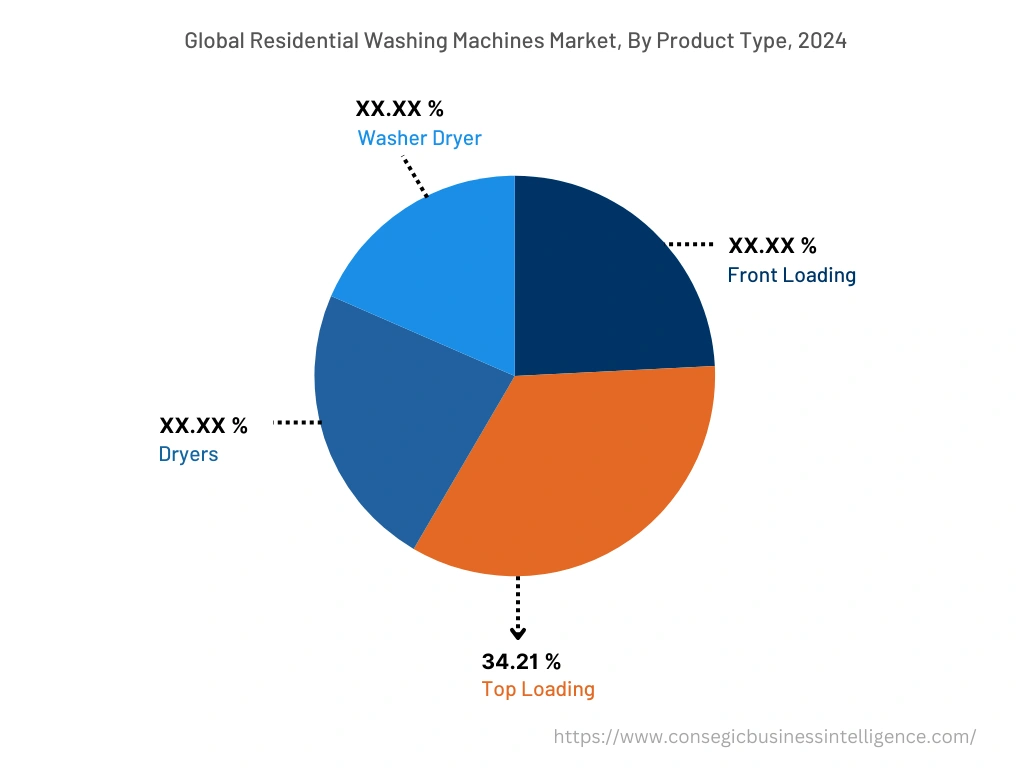
Based on the Technology :
Based on the technology, the market is bifurcated into smart connected and conventional. The conventional residential washing machine segment accounted for the largest revenue in the year 2024. Conventional washing machines are standalone machines that function independently without any advanced features such as AI, voice control, and remote control. The machines are able to wash clothes efficiently with high load capacity. Moreover, conventional washing machines allow users to customize the washing capabilities according to the requirements, thereby contributing to the development of the market.
The smart connected washing machines are anticipated to emerge as the fastest growing segment during the forecast period. The integration of smart technology into washing machines allows users to start and stop the washing machines remotely from smartphones. Moreover, users also receive alerts on phone when a load is done or when the appliance needs maintenance or troubleshooting. Furthermore, the ability to connect washing machines with Wi-Fi and Bluetooth is contributing to the trend of the market.
Based on the Capacity :
Based on the capacity, the market is trifurcated into up to 6 Kg, 6.1-8 Kg, and above 8 Kg. The 6.1-8 Kg segment accounted for the largest revenue in the year 2024 and is expected to witness highest CAGR. Washing machines with capacity 6.1-8 Kg is ideal for majority of households as washing is suited to the strength, capacity, and power requirements of the users. 6.1-8 Kg washing machines are highly energy-efficient, thereby allowing users to save electricity. Additionally, 6.1-8 Kg washing machines are expected to register the fastest CAGR during the forecast period. The machines are available in both top-load and front-load options that attract a large number of users towards this segment. For instance, in September 2022, Panasonic Life Solutions India Pvt. Ltd. launched a new line-up of washing machines with capacities ranging from 6.5 kg, 7 kg and 8 kg. In conclusion, the ability of 6-8 Kg washing machines to wash multiple clothes in different cycles is propelling the development of the residential washing machines market.
Based on the Pricing:
Based on the pricing, the market is separated into low, medium, and premium. The medium price washing machines accounted for the largest revenue share in the year 2024. Medium-priced washing machines have basic washing capabilities that are well-suited to middle income households, allowing users to wash clothes easily and efficiently. The growing affordability of residential washing machines is attracting a strong customer base, thereby resulting in the development of the residential washing machines market.
The premium-priced washing machines are expected to register the fastest CAGR during the forecast period. The high price of residential washing machines is attributed to the advanced features such as AI-control, voice-control and remote control. For instance, in July 2020, Whirlpool launched fully automatic top load washing machines with advanced inbuilt heater technology to remove harmful bacteria and allergens. Furthermore, the growing trend of smart home systems is increasing the requirement for technologically advanced washing machines, thereby driving the development of the segment.
Based on the Sales Channel :
Based on the sales channel, the market is divided into online and offline. The offline segment accounted for the largest revenue share in the year 2024 as residential washing machines are available in a wide range of stores including hypermarkets and supermarkets, specialty stores, and others. Customers exhibit a preference for physical product testing before purchase, particularly for expensive items such as washing machines. Therefore, offline stores provide the opportunity to understand product features and functionality, resulting in the growth of this segment.
The online segment is expected to emerge as the fastest growing segment during the forecast period. The growth of this segment is attributed to the shift in customer behavior of shopping online through e-commerce websites, online marketplaces, and mobile applications. Online sales channel provides an opportunity to the customers to compare prices of different models before purchasing. Furthermore, the facility of home delivery provided by online sales channel is contributing to the growth of the residential washing machines market.
Based on the Region :
The regional segment includes North America, Europe, Asia Pacific, Middle East and Africa, and Latin America.
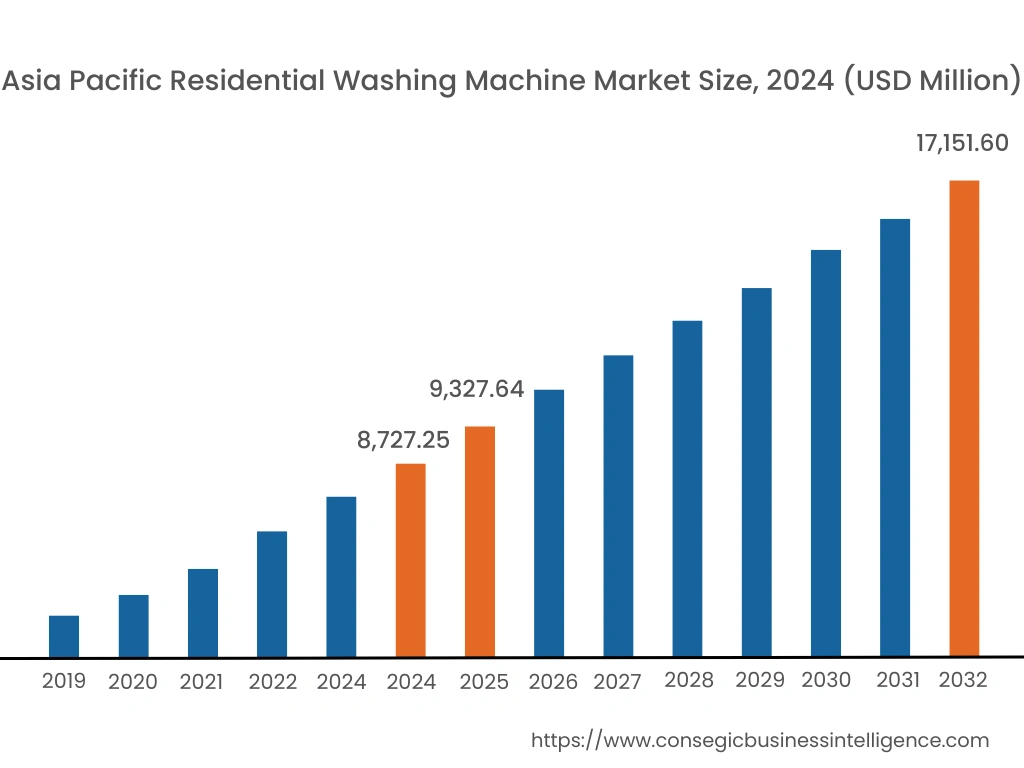
Asia-Pacific region accounted for the largest revenue share in the year 2024 valued at USD 8,727.25 million and is projected to grow at a CAGR of 8.80% during the forecast period. In addition, in the region, China accounted for the maximum revenue share of 28.7% in the same year. The growing adoption of washing machines in majority of households due to the compatibility and user-friendly features is driving the growth of residential washing machines market. Further, according to the residential washing machines market analysis the growing economic development in Asia Pacific countries including India and China is driving the requirement for residential washing machines market trend. Moreover, the government has taken various initiatives toward the development of rural households in developing countries in Asia-Pacific that further increases the trend for these machines.
North America is expected to register fastest CAGR growth during the forecast period. The technological advancements in the region is increasing the trend for washing machines that possess advanced features such as voice control and remote control. Based on the analysis the growing trend of smart home systems in countries such as U.S. and Canada is accelerating the demand for washing machines in the region. Furthermore, as per the analysis the growing awareness among consumers about the energy-efficiency of these washing machines is propelling the market. For instance, ENERGY STAR certified washing machines use 20% less energy and approximately 30% less water than regular washers. Thus, the growing consumer awareness along the changing lifestyle is driving the residential washing machines market growth of the regional market.
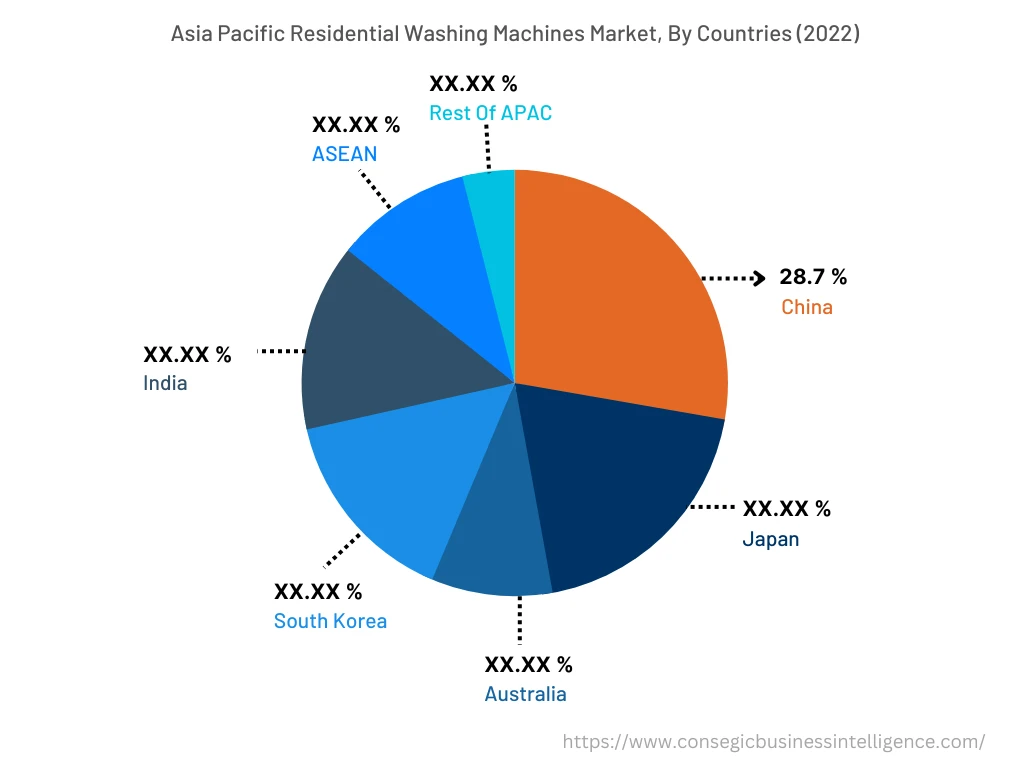
Top Key Players & Market Share Insights :
The residential washing machines market is highly competitive with a large number of market players offering these washing machines to domestic and international markets. The market players are adopting several strategies such as product innovation, Research & Development (R&D), and application launches to hold a strong position in the global market. Key players in the residential washing machines market include-
- Electrolux AB
- Whirlpool Corporation
- Panasonic Corporation
- Samsung Electronics Co. Ltd.
- Godrej Industries Ltd.
- Haier Group Corp
- IFB Industries Ltd.
- LG Electronics Inc.
- Mirc Electronics Limited
Recent Industry Developments :
- In December 2021, Whirlpool Corporation introduced new top load washer with 2-in-1 removable agitator for efficient removal of stains from the clothes.
- In January 2022, Samsung collaborated with Patagonia to launch washing machine that reduces the spread of microplastics from clothes.
Key Questions Answered in the Report
What is residential washing machine? +
Residential washing machines are the household appliances that are utilized to wash daily clothes and laundry. Washing machines consists of a barrel where clothes are placed. The barrel is filled with water and then rotated at a very high speed to remove dirt from the clothes.
What specific segmentation details are covered in the residential washing machines market report, and how is the dominating segment impacting the market growth? +
The report consists of segments including Operation, Product Type, Technology, Capacity, Pricing, and Sales Channel. Each segment has key dominating sub-segment being driven by the industry trends and market dynamics. For instance, by capacity segment has witnessed 6-8Kg as the dominating segment in the year 2022 as the capacity is well-suited to the requirements and needs of households.
What specific segmentation details are covered in the residential washing machines market report, and how is the fastest segment anticipated to impact the market growth? +
The report consists of segments including Operation, Product Type, Technology, Capacity, Pricing, and Sales Channel. Each segment is projected to have the fastest-growing sub-segment being fueled by industry trends and drivers. For instance, by operation segment has witnessed fully-automatic washing machines as the fastest-growing segment due to its ability to wash clothes automatically without any human intervention.
Which region/country is anticipated to witness the highest CAGR during the forecast period, 2025-2032? +
The Asia-Pacific region is anticipated to register fastest CAGR growth during the forecast period due to the growing adoption of washing machines in households as a result of its convenient and user-friendly features.
